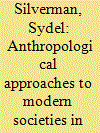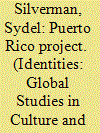| Srl | Item |
| 1 |
ID:
109976


|
|
|
|
|
| Publication |
2011.
|
| Summary/Abstract |
At the time that Julian Steward was formulating the Puerto Rico Project, several other approaches to complex societies were being pursued by American anthropologists. Beginning in the 1920s, funders'-and subsequently, New Deal agencies'-interest in addressing social problems impelled microcosmic community studies in the United States. That approach, essentially functionalist and ahistorical, was extended to village studies in other countries, and Redfield's folk-urban continuum became the dominant theoretical framework for comprehending regions within nations. Concurrently, acculturation theory legitimized anthropological interests beyond "primitives" and offered an alternative, two-way cultural contact model. With the onset of World War II, the culture and personality approach was applied to strategic nations, providing holistic configurational depictions of national character. Steward's effort can be seen as a critique of, and alternative to, these approaches that were prevalent in the late 1940s. Building upon his method of cultural ecology, his orientation toward work, and his notions about sociocultural integration, he devised a different way of studying a total society. Steward's framework was modified and expanded by members of his team, both in the field and in the writing of the jointly authored book. While slow to have a wider impact, the project-both in its successes and its limitations-signaled new departures for the anthropological study of the modern world.
|
|
|
|
|
|
|
|
|
|
|
|
|
|
|
|
| 2 |
ID:
109975


|
|
|
|
|
| Publication |
2011.
|
| Summary/Abstract |
In the late 1940s Julian Steward initiated a social anthropological study of Puerto Rico, carried out by a team working in a range of communities representing different ecological zones. The project was a landmark in anthropology but met with criticism from Puerto Rican scholars. The articles in this collection reconsider the Puerto Rico Project in terms of its place within the history of anthropology, its reception in Puerto Rico and elsewhere, and some theoretical and political issues raised by it.
|
|
|
|
|
|
|
|
|
|
|
|
|
|
|
|